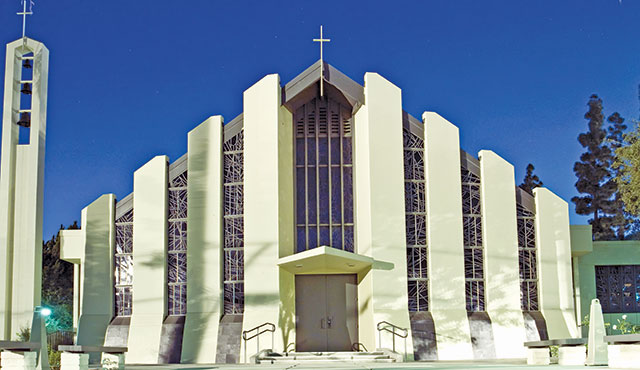Between a deadly pandemic, economic uncertainty and civil unrest, many parishioners find themselves stressed and stretched, turning to their faith for guidance amid an uncertain future.
Fortunately, the Diocese of Orange and its parishes are here to help.
While the Diocesan organization doesn’t directly provide mental health services — namely in the form of therapy or formally diagnosing a medical condition like depression — it does do the next best thing: pointing those who seek help within their parish communities in the right direction, in accordance with their faith.
This scenario is a different approach than other medical situations, explained Linda Ji, director of the Diocese’s Office for Family Life.
“If someone has cancer, the faith community wraps its arms and tries to support the family,” Ji said. “This isn’t always the same case with someone suffering from a mental health issue, but it should be. They also need support, both spiritual and communal.”
That support is achieved two ways: by training teams of mental health ministers and by compiling a list of Diocesan-recommended mental health care providers.
The former group acts as a first contact within the Catholic family community, said Margery Arnold, mental health ministry coordinator with the Diocese’s Office for Family Life. These volunteers receive mental health first aid training, which involves recognizing the signs of mental illness and substance use disorders.
“They are there to remind people that they are loved by God and have a community who wants to help them,” Arnold said.
Ji said some of the volunteers have personal experience dealing with these types of issues within their own families.
“They are offering themselves as peer supporters to others in their community who are being challenged,” she said.
The latter is a special list of licensed mental health professionals who have their own private practices and are not connected to the Diocese in any official capacity. About 30 are on the list, and some speak Spanish, English or Vietnamese.
To get on the list, the professionals agree to a pledge with four parts: to continually improve their own professional abilities; to respect patients, putting their interests ahead of political or economic considerations, and not to show any prejudice arising from religion, racial, ethnic, socioeconomic or sexual differences; to understand and respect their beliefs and values as Catholic clients; and to cooperate with just law, except on the grounds of conscientious objection when the civil law does not respect human rights.
Throughout the Diocese of Orange, 10 parishes supported by eight teams provide the mental health support. In English, there is St. Irenaeus in Cypress, St. Martin de Porres in Yorba Linda, San Antonio de Padua in Anaheim, Our Lady Queen of Angels in Newport Beach, Santiago de Compostela in Lake Forest, St. Kilian in Mission Viejo, St. Edward the Confessor in Dana Point and Our Lady of Fatima in San Clemente. In Spanish, there is St. Boniface in Anaheim and St. Joachim in Costa Mesa.
The Diocese’s program is being aided by a three-year grant from the Catholic Institute for Mental Health Ministry at the University of San Diego. Arnold, a licensed psychologist who last worked at Western Youth Services in Mission Viejo, heads the program on a part-time basis.
Ji credits Bishop Kevin Vann with spearheading the program. He has partnered with Rick and Kay Warren of Saddleback Church on mental health and the Church.
Bishop Vann “has been a spokesperson about mental health ministry in this diocese,” Ji added.
Jennifer Dagarag, a registered nurse, is seeing how parishioners’ mental health is being affected by the pandemic. She serves as the faith community nurse at St. Irenaeus, which also has a faith-based support group guided by the National Alliance on Mental Illness (NAMI).
St. Irenaeus has had seminars on anxiety and depression. They plan to do a mental health topic presentation each quarter. All of that has been helpful as rates of overall anxiety, depression and uncertainty are rising, Dagarag said.
“This is partly due to isolation,” she added. “People can’t come to Mass as easily. Mass can be a community.”
Dagarag added that young people are being particularly affected. With distance learning, many are missing out on the socialization aspect of school, and the big milestones that come with it: homecoming dances, prom, walking at graduation.
“That all looks different for them,” she said. “They don’t have a lot of life experience to relate to and yet now they’re missing these milestones. They don’t have that long-term thinking yet. It’s the biggest thing that’s happening in their lives right now. They’re not just missing one event. They’re missing multiple ones.”
RECOMMENDED READING LIST
- “I am Not Sick I Don’t Need Help!,” by Xavier Amador, Ph.D. with Anna-Lisa Johanson
- “Sitting like a Saint: Catholic Mindfulness for Kids,” by Dr. Gregory & Barbra Bottaro
- “The Mindful Catholic: Finding God One Moment at a Time,” by Gregory Bottaro

